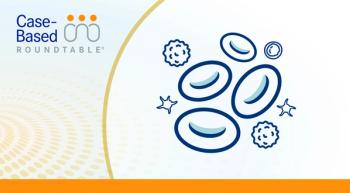
Novel Treatments and Combinations for the Treatment of Patients With CLL
Catherine Coombs, MD, MS, shares her thoughts on the future of treatment and where the field is moving for patients with CLL.
Episodes in this series

Catherine Coombs, MD, MS: The last question relates to the future of CLL [chronic lymphocytic leukemia]. I had briefly alluded to my excitement related to the reversible BTK [Bruton tyrosine kinase] inhibitors. However, there is a lot more going on than just those. The first thing I’ll touch on is the combination of BTK inhibitors with venetoclax. We know venetoclax is extremely effective, however, when paired with obinutuzumab, this requires patients to receive an IV [intravenous] therapy that can be complicated by occasionally dangerous infusion reactions. The idea of combining venetoclax with a BTK inhibitor obviates the need for any sort of IV therapy, leading to an all-oral regimen that is also time limited. Those combinations are very attractive. We have pretty mature data on the combination of ibrutinib with venetoclax from a number of different cohorts, including the very well done CAPTIVATE trial, also the GLOW study. I’m also really excited to see the combination of venetoclax with these newer-generation BTK inhibitors, including acalabrutinib and zanubrutinib.
The next hugely important focus in CLL is CAR [chimeric antigen receptor] T-cell therapy. There’s been a lot of press surrounding CAR T potentially curing a couple of patients with CLL. The limitation of CAR T is, of course, that there is a lot of work to get the T cells generated for any given patient, and there are toxicity concerns. But I think over the next decade these will continue to be improved upon and likely serve a bigger role for our patients for another type of cellular therapy in addition to allogeneic stem cell transplant, which we use a lot less of, given the high toxicity for that in the CLL patient population.
Some other newer areas are bispecifics, and then these other reversible covalent BTK inhibitors. The other thing I hadn’t mentioned is there are some BTK degraders. It’s just looking at getting to BTK, this critical signaling protein, in different modes of attack. I think we’ll see emerging data on all of those exciting new strategies in the future, which I think is very bright for patients with CLL, increasing the access and options to multiple lines of effective therapies.
Transcript edited for clarity.



















